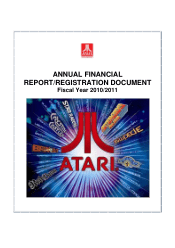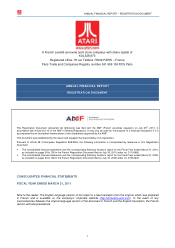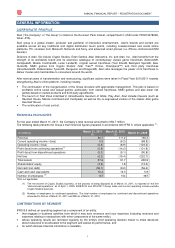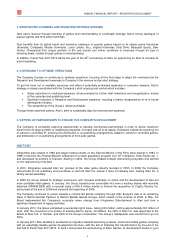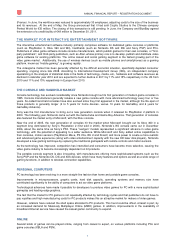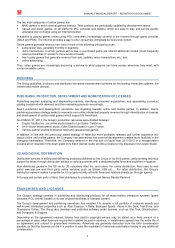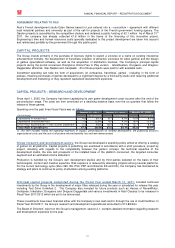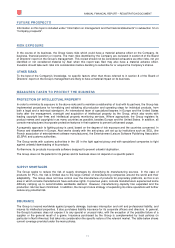Atari 2011 Annual Report Download - page 10
Download and view the complete annual report
Please find page 10 of the 2011 Atari annual report below. You can navigate through the pages in the report by either clicking on the pages listed below, or by using the keyword search tool below to find specific information within the annual report.
ANNUAL FINANCIAL REPORT – REGISTRATION DOCUMENT
10
AGREEMENT RELATING TO R&D
Atari’s French development studio Eden Games based in Lyon entered into a « consortium » agreement with different
local industrial partners and university as part of the call for projects of the French government funding agency. The
Garden projects is accredited by the competitive clusters and obtained a public funding of €2.1 million. As of March 31
st
2011, the company has already collected €1.6 million in the frame of the financing of this innovative project.
Engineering’s time and human resources costs specially dedicated to this project development are taken into account
and reimbursed partially by the government through this public grant.
CAPITAL PROJECTS
The Group invests primarily in the purchase of licenses (rights to exploit a universe or a name on existing interactive
entertainment formats), the development of franchises (creation of attractive universes for video games) and the design
of games (specialized software), as well as the acquisition of distribution licenses. The Company’s principal capital
projects during the period concerned Champions Online Free to Play version, , Ghostbusters, Dungeons and Dragons:
Daggerdale, Warlords, Star Raiders and Centipede . All of those projects were paid for with available cash.
Investment spending can take the form of acquisitions (of companies, franchises, games - including in the form of
pickups, meaning purchases of games developed to a significant degree by a third-party studio and requiring additional
development and marketing) or may represent capitalized development expenses.
CAPITAL PROJECTS – RESEARCH AND DEVELOPMENT
Since April 1, 2005, the Company has been capitalizing its own game development costs incurred after the end of the
pre-production stage. The costs are then amortized on a declining balance basis over the six quarters that follow the
release of these games.
Spending over the past three Fiscal Years was as follows:
(in € millions)
% revenues % revenues % revenues
Capitalized in-house R&D 4.6 8.1% 6.7 6.0% 10.9 8.0%
Capitalized outsourced R&D 7.3 12.9% 4.5 4.0% 18.4 13.5%
Other R&D expenditures in the income statement* 5.4 9.5% 16.3 14.7% 12.7 9.3%
Total R&D expenditures 17.3 30.5% 27.5 24.7% 42.0 30.8%
March 31, 2011 March 31, 2010 March 31, 2009
(*) This item includes mainly the operating expenses of studios, pre-production on initiated development, the publishing division’s
organizational costs and the cost of all projects whose feasibility has not been demonstrated.
Group research and development policy: the Group has developed a spending policy aimed at offering a catalog
of games for all platforms. Capital projects in publishing are examined in accordance with a strict procedure, project by
project, including with regards to the compatibility between the game’s concept, the technical expertise of the
development studio, the size and prospects of the installed base of the platform concerned, the targeted consumer
segment and an estimated income statement.
Production is handled by the Group's own development studios and by third parties selected on the basis of their
technological, content and creative expertise. Risk exposure is reduced by allocating projects among several platforms.
For the current technology cycle (Xbox 360, Wii, PS3, PSP and Nintendo DS and DSi), the Company has maintained its
strategy and plans to continue its policy of allocation among existing platforms.
Principal capital projects completed during the Fiscal Year ended March 31, 2011: included continued
investments by the Group in the development of major titles released during the year or scheduled for release this year
including Test Drive Unlimited 2. The Company also invested for future products such as Heroes of NeverWinter,
Centipede: Infestation, Dungeons and Dragons Daggerdale and various investments in Atari Classics to be released in
Fiscal Year 2011/2012 which are yet to be announced.
These investments have been financed either with the Company’s own cash and/or through the use of credit facilities. In
Fiscal Year 2010/2011, the Group’s research and development expenditures amounted to €13.8million.
The Board of Directors’ report on the Group’s management, section 2.1, contains detailed information regarding research
and development expenses for the year.

